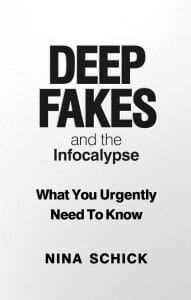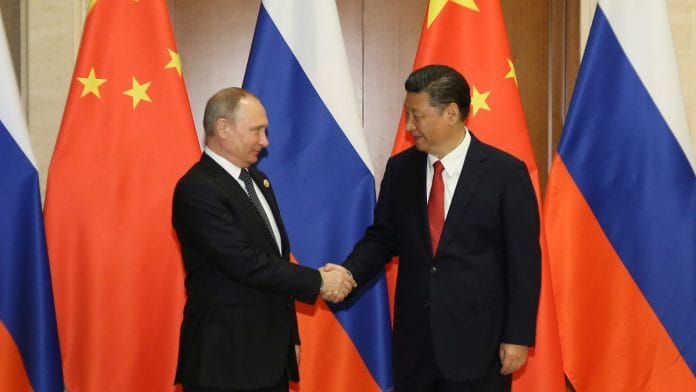Russian President Vladimir Putin is a real-life Bond villain. His staged photo opportunities, meant to showcase his masculinity, are, ironically, extremely camp. Here is the Russian President riding a horse bareback and topless; there he is pumping iron in the gym in a $10,000 outfit; or catching and kissing a ‘70 kg’ pike. He might as well be stroking a white cat while he plots his global domination. No surprise, then, that with his reputation for being a ‘badass’, President Putin has secured a place in the pantheon of Internet memes. However, these humorous associations with the image of Russia may lead us to underestimate the true threat the country represents in the Infocalypse.
Putin is one of the most dangerous men in the world. Over the last decade of his rule, Russia has started to enjoy an outsized geopolitical influence, partly because it uses the chaos of the Infocalypse to perpetrate ever-bolder attacks on the United States and the rest of the West. Russia was already a master of information warfare long before the Infocalypse came to define our information ecosystem. But by tracking three Russian disinformation campaigns against the United States from the Cold War to 2020, I hope to demonstrate how Russian attacks are becoming more dangerous in the Infocalypse. Moreover, Russia is also inspiring copycats, as other rogue and authoritarian nations seeking to exploit the conditions of the Infocalypse look to Moscow for inspiration.
Russia is inspiring other states, too. If Moscow can get away with these attacks it sends a signal to the rest of the world. The United States and its Western allies appear vulnerable and immobilized in the face of the Infocalypse. The Pentagon found that other state actors, notably China, are sympathetic to Russian strategic aims against the United States and the West, due to their ‘growing alignment’ which sees them ‘share a fear of the United States’ international alliances and an affinity for authoritarian stability.’
To understand more about how other rogue and authoritarian state actors are interpreting and emulating Russian actions in the Infocalypse, I spoke to Renée DiResta about the geopolitics of information warfare. Renée told me that Russia is still the master in the field, in part because ‘it makes much more of a long-term investment’. Moscow is prepared to lay the groundwork for operations ‘over years and decades’. I asked Renée about China. She told me that while Beijing is not as strong as Russia on foreign operations, it has the same kind of long-term game plan domestically’. So far, China has successfully exploited the Infocalypse ‘mostly against its own citizens’, having been hugely successful in that endeavour due to the fact that it controls its Internet ecosystem. There, it can monitor and controls billions of Chinese citizens on platforms including Weibo, WeChat and QQ. However, China is increasingly starting to look beyond its own borders. Researchers at the University of Oxford found that the Hong Kong protests in summer 2019 marked a turning point, with China starting to show an ‘aggressive’ new interest in infiltrating Western platforms including Facebook, Twitter and YouTube, something they say should ‘raise concerns for democracies’.
Also read: Why it makes good business sense for investors to trust countries with a free press
When Renée described some of the Chinese-sponsored operations she has seen on Twitter, it was clear that the Russians are still in a different league. Around the Hong Kong protests, Renée told me she had come across pro-China Twitter accounts which were ‘sloppy bot-net garbage’. Their creators had not even bothered clearing out their past timeline to disguise the fact that they were fake, appropriated accounts. Scrolling down the timeline of past tweets, ‘you’d find that they’d be tweeting about Ariana Grande, when suddenly they’d learn to speak Chinese and develop a passionate interest in Hong Kong politics,’ Renée said, laughing. But don’t expect Beijing to remain this clumsy for much longer. As will be explored in Chapter 6, the volatile geopolitical situation around Covid-19 has seen China quickly learn how it can better exploit the Infocalypse.
Also read: China and Russia are spreading misinformation about coronavirus, EU says
It is not only China and Russia who are using the chaos of the Infocalypse to their advantage. Renée and I discussed other emerging actors: Iran, Saudi Arabia, the United Arab Emirates and North Korea. Oxford University researchers found evidence of 28 countries practising some form of online disinformation operations in 2017. In 2020, this number has risen to 70.While all these state actors pose serious threats in the Infocalypse, for now there are orders of magnitude between the sophistication of the Kremlin’s efforts and those of the others. In one study from 2019, researchers from Princeton found that Russia was responsible for 72 per cent of all foreign disinformation operations between 2013 and 2019. This makes it almost three times as aggressive as all the others combined. If Russia is a maestro playing a Tchaikovsky sonata from memory on a grand piano, then the others are playing ‘Twinkle, Twinkle, Little Star’ on a child’s keyboard.

Excerpted with permission from Deep Fakes and the Infocalypse by Nina Schick, published by Monoray and distributed in the Indian subcontinent by Hachette India.






